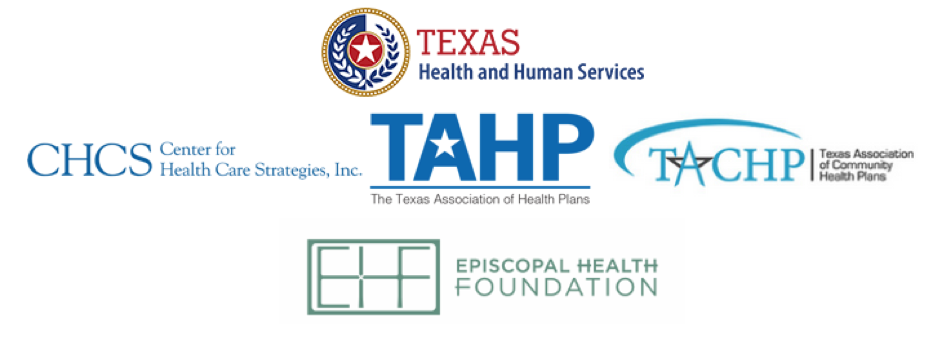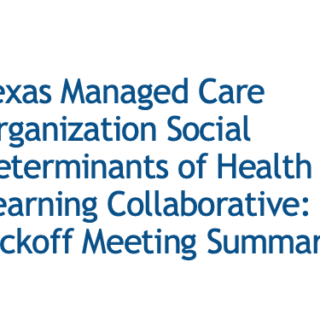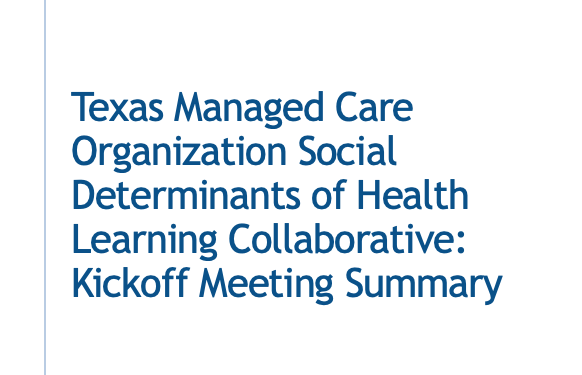A group of health sector stakeholders has launched a new learning collaborative designed to help Texas Medicaid health insurance plans develop and implement strategies to address the non-medical, root causes of poor health for patients across the state. The 12-month project will focus on access to healthy food, housing conditions, transportation, and other social factors that often have a direct impact on a person’s health.
This report is a summary of the collaborative’s kickoff meeting in Austin.

In Texas, most Medicaid services are delivered through managed care organizations (MCOs). The new collaborative will provide technical assistance and opportunities for Texas’ Medicaid managed care organizations to learn from one another and from leading-edge Medicaid health plans and provider innovators across the country.
The group will share promising practices and collaborate to address a variety of social determinants of health needs among Medicaid beneficiaries across the state. Social determinants of health are the conditions in the places where people live, learn, work, and play that affect health outcomes.
The new Texas Managed Care Organization Social Determinants of Health Learning Collaborative is a partnership between the Texas Association of Health Plans (TAHP), Texas Association of Community Health Plans (TACHP), Center for Health Care Strategies (CHCS), and the Texas Department of Health and Human Services (Texas HHS), with support provided by Episcopal Health Foundation and Robert Wood Johnson Foundation (RWJF).
“Medical care alone isn’t enough to keep many Texans healthy, especially for those below the poverty line who depend on Medicaid,” said Elena Marks, President and CEO of Episcopal Health Foundation. “This project will help find programs and solutions to improve patients’ health outside the doctor’s office and incorporate them into the Medicaid system.”
“Medicaid managed care organizations play a pivotal role in delivering and incentivizing care that keeps people healthy,” said Meshie Knight, program officer at RWJF. “RWJF is pleased to support this project that aims to equip managed care organizations with tools, resources and best practices to better address the physical, mental health and social needs and goals of their beneficiaries.”
More than 50 participants representing 15 managed care organizations, Texas Health and Human Services, and other groups recently met in Austin to launch the collaborative’s work. The group learned about efforts around the country to address social determinants of health through Medicaid managed care programs, as well as existing Texas-based strategies that are currently addressing non-medical factors affecting patients’ health.
Partner perspectives:
“Texas Medicaid managed care plans provide the care coordination and one-on-one support Texans need to get and stay healthy—services that go beyond the walls of a doctor’s office such as transportation, housing, and meals,” said Texas Association of Health Plans CEO Jamie Dudensing. “This learning collaborative will help our state expand efforts to address social determinants of health so that Texans on Medicaid receive the support they need to stay healthy, thrive at school and work, and live the fullest lives possible.”
“The Texas community-based MCOs appreciate the support of these two foundations and CHCS in helping address the social factors that affect health care,” said Kay Ghahremani, President and CEO of the Texas Association of Community Health Plans.
“CHCS is delighted to support Texas’ Medicaid MCOs in this important work to address the social factors influencing health care outcomes,” said Tricia McGinnis, Executive Vice President and Chief Program Officer at the Center for Health Care Strategies. “The collaborative will help accelerate innovations already underway and create sustainable mechanisms for embedding interventions to meet social needs into MCO business models.”

